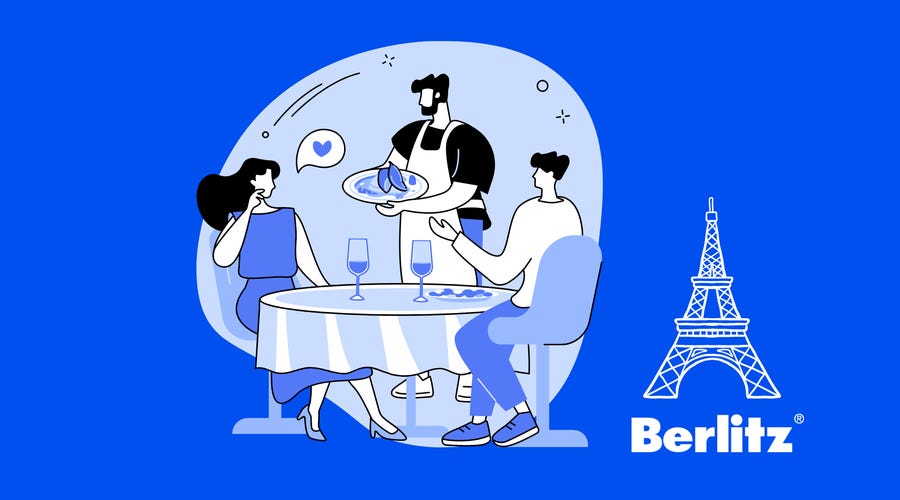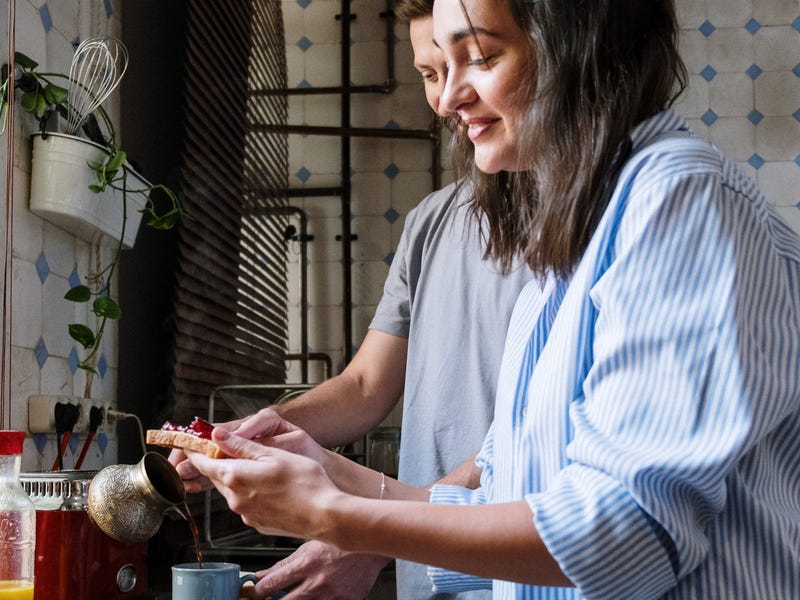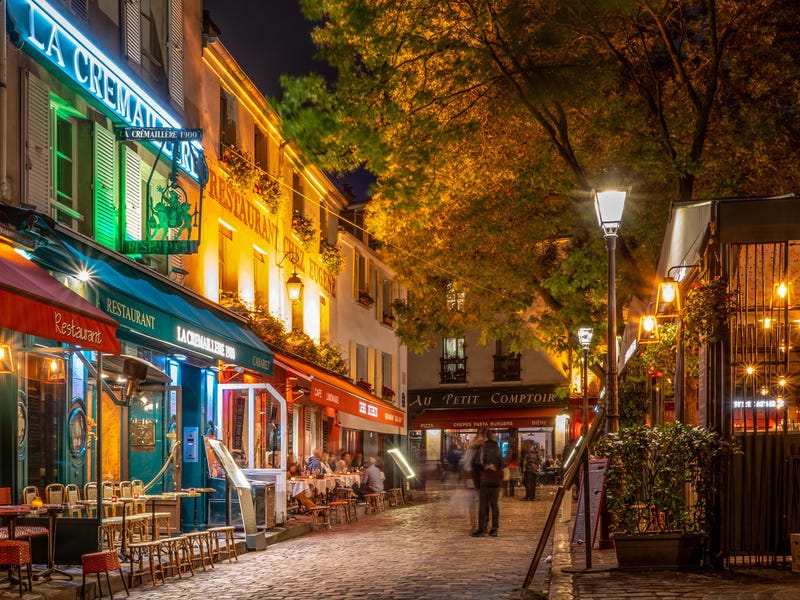
French etiquette: A guide to dining, eating, social settings & more
Author: Elinor Zucchet
So, you’ve decided to dive headfirst into the mysterious world of French culture? Whether you're planning a trip, moving to France, or just trying to impress that one French friend who seems effortlessly stylish even when grocery shopping — we all have a friend like this! — knowing a bit about French manners and etiquette is going to save you from some serious faux pas.
After all, a successful immersion is not limited to the language, so this article on French manners and etiquette will be helpful even if you master “la langue de Molière”!
You might be thinking, “How complicated can it be? Smile, say “bonjour” and eat a croissant, right?” Well, first, many Parisians hate Emily in Paris! And second, French etiquette is a little more nuanced than that. But don't worry, I’m here to tell you everything you need to know to avoid being an overly-friendly American and fit right into the French etiquette!
French manners and etiquette for greetings
Greetings are key in any culture, as a good first impression can make all the difference!
Make sure to learn How to say hello in French and How to say good morning the proper way, and then keep reading.

Handshakes and kisses
Before you start freaking out about the weird French manners to say hello, let me tell you a small anecdote. The first time I went to the US, at 15, my host family was waiting at the airport to greet me. Instinctively, I went for two kisses on the cheeks — la bise, quoi ! — and the expression on their faces was priceless. Of course, they expected a hug, so we talked about it and had a good laugh!
What I’m trying to show you is that faux pas happen and are a key part of any cultural experience. So, don’t overthink it, and here are a few tips for you.
The French are famous for their “bise,” those cheek-to-cheek kisses that look oh-so-chic but can feel like you’re starring in a rom-com gone wrong if you don’t know the rules. Indeed, when you greet someone in France, especially a friend or close acquaintance, don’t be surprised if they lean in for a kiss on both cheeks. Yes, both! Sometimes three or four if you’re in the south, but let’s not overcomplicate things just yet.
And French people also get it wrong sometimes, as some will lean on the right side first, and some of the left.
Now, if you’re more of a “handshake, no touching” kind of person, a handshake is totally acceptable too but usually a lot more formal — for example in a business setting, or meeting someone for the first time. Make it quick and firm. And whatever you do, high-five isn't really a thing!
Titles and formality
The French looove their titles. Think of them as little linguistic badges of honor. “Monsieur” for the gents, “Madame” for the ladies, and “Mademoiselle” for the young or single women. That being said, the whole “Mademoiselle” thing is on its way out. More on this here!
When in doubt, stay on the side of formality. Start with a title, “vous”, and only drop it if invited. You’re not just being polite; you’re showing respect.
What to avoid when greeting French people
Okay, now you know what to do, so here’s what not to do: don’t get too familiar too fast. If you’re too informal too quickly, you might hear: “On a pas gardé les cochons — or les vaches — ensemble” (We haven’t kept the pigs, or cows, together), which is an expression indicating an excessive degree of familiarity. Discover other animal expressions in French here!
If you’re reading us from the US, you might think that a big bear hug is a universal sign of friendship, but in France, it’s more like a sign that you’re a bit too eager. Yep, being overly friendly is a thing in France, and French people like their space! Also, avoid using someone’s first name unless they offer it up.
French dining etiquette
Who hasn’t heard of French gastronomy? As in any country, food is an essential part of the local culture, and it comes with its own French dining etiquette! And if you’re foodie, don’t miss these two articles:
General eating and table manners
First things first: utensils — this scene comes to my mind! Fork in the left hand, knife in the right. Keep your hands on the table, but elbows off. Got it? Très bien !
When it comes to wine, and there will always be wine, the host will usually pour it for you. And if they don’t, just wait. Pouring your own wine can come off as a little… impoli or in a rush.
And the French don’t rush when it comes to food or drink. That’s a big difference with the US! If French people go to the restaurant, it’s usually because they have time, and it involves socializing.
Restaurant etiquette
Eating out? Sounds great, France has a lot of awesome restaurants!
When you come in, make sure you greet the staff with a “Bonjour !”
When ordering, avoid asking a million questions or requesting a swap with the ingredients, unless you have a severe allergy, of course! Choose your dish, order with confidence, and trust that the French know what they’re doing in the kitchen.
If you’re with other people, wait until everyone has their food and someone says “Bon appétit” to start eating. I know, it’s hard when all the food doesn't come at the same time, but it’s definitely part of French eating etiquette. Sometimes, someone who didn’t get their food yet will prompt others to “start without them.¨ In such a case, you may proceed!
And when it comes to tipping, it’s not mandatory as it is in the U.S. That being said, if you’re happy with the service — a word of warning: it might not happen all the time — leaving a little extra is always a nice gesture, even if just a few coins. When my American husband moved to Europe, he was shocked to see that people leave very small coins, but it’s not rude!
Home invitations
You made a French friend and they invited you over? Bravo !
First piece of advice: don’t show up empty-handed. Bring a little something like a bottle of wine, flowers (but no chrysanthemums — more common in cemeteries — unless you’re aiming for a major faux pas), or chocolates. You can also ask the host if you can bring dessert, or if there’s anything else they’d like you to bring.
When you’re at the table, wait for everyone to be seated before you dive in. And if they offer you seconds, don’t be afraid to accept! It’s a sign that you’re enjoying the meal, and that’s the best compliment you can give.
My American husband always laughs when there’s just one piece of food left on a plate, for example, a slice of saucisson at “apéro”. Nobody will take it and everyone will insist that others have it, often leaving several plates with just one food item left!
The French communication style

Politeness and directness in French culture
It can seem like a paradox, but the French have a way of being polite while simultaneously telling you exactly what they think. It’s an art form, really. In conversation, you should definitely use a lot of “s’il vous plaît” and “merci” — check our guide to say Thank you in French — where appropriate.
However, don’t be afraid to speak your mind. The French appreciate honesty, as long as it’s delivered with a side of tact.
Actually, this honesty might sometimes come off as shocking to Americans, who tend to be — let’s say it — a lot nicer. For example, if you try on a dress in the US, your friends will be like “OMG, so cute, perfect, you look lovely, I loooove it” while in France, it’s not uncommon to hear comments like “Well, it’s original but I wouldn’t wear it” or “It doesn’t really do you any favors.¨
Small talk and conversation topics
What would we do without small talk? It’s so convenient when trying to establish communication, right?
And France is no different. When making small talk, stick to safe subjects like food, art, and culture. The French love to chat about their latest culinary finds or the newest exhibit at a trendy museum.
Very important: avoid topics like politics, religion, and money, which are considered taboo in French culture — sometimes even with close friends! Unless, of course, you enjoy watching a peaceful dinner turn into a heated debate. Actually, it might be a great way to practice your French skills!
Importance of non-verbal cues
The French are all about that je ne sais quoi, and non-verbal communication is a huge part of that — especially if your French skills are not that great yet! If you’re interested in the subject, don’t miss our article on body language around the world.
Eye contact, a well-timed shrug, or even just the way you stand can say a lot. So, keep those non-verbal cues in mind. For instance, crossed arms can show that you’re closed off — for example in a business meeting — while a warm smile can open doors (and hearts).
If you want to know more about French business etiquette, check out this article!
French dress code and personal appearance

The French fashion sense
French fashion might be as popular as French food! Indeed, fashion in France is practically a national sport, and actually, they even brought it to the Olympics!
The key here is (seemingly) effortless style, which, ironically, can take a lot of effort. Think classic, understated pieces that look like you just threw them on, even if you spent an hour getting ready. Check this video for the latest Parisian trends! Avoid anything too flashy or over-the-top. And speaking of which, do you know your clothing vocab in French?
The appropriate attire for the occasion
Dressing adequately for the occasion is a must, and an art, in France. You won’t see anyone going to the mall, or even to buy a baguette, in PJ pants and flip flops — you gotta love the US!
Going for a casual stroll or to the bakery? Pick something simple yet stylish, like a nice pair of jeans and a trendy shirt. Heading to a formal event? You can definitely go for a sleek dress, a fancy overall or a suit. If you have a job interview, definitely wear respectful, formal clothes.
As a rule of thumb, it’s always better to be a little overdressed than underdressed.
Cultural significance of dressing appropriately
Indeed, in France, how you dress is more than just about looking good — it’s about respect. Showing up in the right attire says that you’re taking the event (and the people) seriously.
So put a little thought into your outfit; after all, in France, style is definitely a form of etiquette.
French social etiquette and manners

Punctuality in France
I’m French and in love with punctuality — must be my Scandinavian side! However, in France, fashionably late is the way to go for social gatherings. Aim for about 10-15 minutes! Any later, and you’re pushing it. Any earlier, and you’re just awkwardly eager.
But for formal and business events, definitely be on time!
Gift giving
You want to make a “cadeau”? As in many cultures around the world, gift giving is a subtle art of French social etiquette. A small, thoughtful gift is definitely recommended and much appreciated when visiting someone’s home. Just avoid anything too personal or over-the-top, and go for classics such as flowers, chocolates, or anything to eat, actually!
When receiving a gift, open it right away, or it might seem that you’re not interested, and show your appreciation. A genuine “merci beaucoup” is perfect.
Public behavior
My dear American readers, I’m sorry to disappoint you, but public behavior in France is all about discretion. Loud conversations in public? Non, merci. The French value their peace and quiet, especially on public transportation. Take it from a loud French person (I’m also half Italian, it’s in my genes!) who got reminded her entire life to keep it down. I feel so free when I’m in the US!
So, don’t shout, respect the shared space — I shall agree with that one, personal space is underrated! — and you’ll fit right in.
That being said, PDA might shock you. After all, France is known as the country of love, and many couples openly kiss and touch in public! Listen to this song and you’ll get it.
If you’re a hopeless romantic, check out these articles:
Voilà, chers lecteurs ! You’re now ready to navigate the curious, but endearing, world of French manners and etiquette.
But let’s be real for a second — will you mess up? Probably. Even French people mess up! Will you accidentally give two kisses when it’s supposed to be three? Or lean the wrong way? Almost certainly. But that’s part of the fun, n’est-ce pas? Because in the end, what the French appreciate most – and actually, anyone when you’re visiting another country — isn’t perfection, but a sincere effort.
And remember, if you make a faux pas, just smile and say a heartfelt “désolé-e”!
For more fun and useful insights into French culture, check out the Berlitz blog here. Now go out there and have fun experimenting with your French manners and etiquette — just don’t forget “la bise”!


